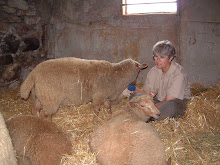Many of our purebred lambs look like they have been in a paintball fight with green splotches all over their heads and a few hand marks on their bodies. We just went through the exercise of tattooing the youngsters that will be kept or sold as breeding stock and the cross-bred ewe lambs that we are keeping for our commercial flock.
Why do we tattoo? First, we need a permanent, non-removable identifier on all animals for traceability and record keeping, and second, tattoos are required for registration of purebred animals. Only animals that we consider of sufficient quality to be breeding animals are tattooed whether they be purebreds or not.
We have often been asked if we will sell a purebred animal for breeding without registration papers for less than a registered purebred and the answer is no. We feel that purebred registries are critical for tracking bloodlines and keeping data on purebred animals especially for the rare breeds. It is only through that information can we ensure that much needed genetic diversity within a breed is maintained.
If our purebred sheep are of sufficient quality to be used as breeding stock they will be registered. If they are not of sufficient quality to be used as breeding stock they will be sold as freezer lamb. Period.
When I see advertisements for registered animals at $400 and unregistered animals at $200, I really scratch my head for the reasoning for the price difference. Registration fees are negligible in the total cost of an animal. For example it costs me $10 to register a lamb under 18 months of age. The only reason for the price difference is either the quality of unregistered animal is greatly inferior to that of the registered animal or the unregistered animal is either not pure or is unregisterable. Any other reason such as the breeder can't be bothered is just straight bad economics or possibly deception.
An unregistered purebred animal is known as a grade animal in the livestock world. There is nothing wrong with grade animals and there are some exceptional specimens in grades. Same as there is nothing wrong with crossbreds. However it is a false sense of economy to buy a grade animal with the assumption that you will be able to register it sometime in the future. I have seen more than one beginning breeder get burned by that assumption. If you want a registered animal, buy a registered animal from a reputable breeder. Have a sale contract stating that the animal is registered and the registration papers will be transferred. If you buy an unregistered animal, make the assumption that you never will be able to register it.
If you are breeding animals become a member of the appropriate breed association. Administrative fees such as registration and transfers are less expensive for members. Know the breed standards, breed within the standards and register your animals.
Why should you buy registered animals? Registration papers are as close to a guarantee as possible that the animal that you have purchased is purebred and is recognized by the breed association. You also have an extended record of the animal's ancestry. I was able to trace the ancestry for one of my mares back over 100 years. While that exercise was interesting knowledge of the more recent ancestry is necessary to knowledgably breed your animal.
In an earlier post, I talked about heterosis and the healthy mutt. Heterosis works best if you cross two purebred lines. So in order to have that advantage you need to maintain purebred lines as well as crossbreds.
At Hawk Hill we register our best quality purebred animals, we follow the breed standards and we are members of the appropriate breed associations. If you buy a purebred animal from us, you will be buying a registered purebred. No unregistered, purebred bargains here.
TTFN,
Laurie
Subscribe to:
Post Comments (Atom)


No comments:
Post a Comment